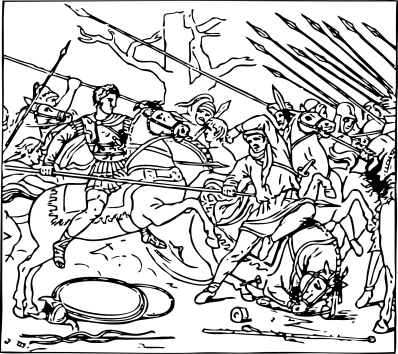by Gunnar De Winter

If you are still reading, I’ll assume that the first forty-seven ways to build a lover did not work for you. In truth, they are conventional. Physical attraction, open and honest communication, accepting each other’s flaws. One might call them boring. Unimaginative even. If those work for your, great. You can stop here. I hope you are – and will remain – happy.
For those of you who stuck around: welcome. The final three methods to build your lover are not without their challenges and none of them is entirely foolproof. They beat fate, though.
48. PLUG-IN (HYBRID?)
Female mantids decapitate and consume their partner after mating. After all, following sperm deposition, the male has become superfluous. Better make use of him while you can. Remarkably efficient thinking.
Fortunately, we don’t need to resort to murder. A simple sample will do. Once you have found the template person, a strand of hair – ideally more than one, to be sure – will suffice to initiate the process. After DNA extraction you will reprogram one of your skin cells into a spermatozoon. Then, using a freely available blank oocyte kit, you’ll package the lover’s template DNA into a nucleus (included in most quality kits). Next, you’ll fertilize the egg, plug it in an artiwomb (which will be your largest investment for this method), and watch the magic. I would suggest not exceeding the one year per day rate of growth. Previous experimentation revealed an increased risk for developmental anomalies when pushing harder.
During the weeks where your lover develops, you will have to keep a close eye on the developmental trajectories. You will also have to spend a lot of time imprinting. Experience tells us that sound – your voice – is the input to start with even on day one. By day three their visual system will be at full capacity, so from that point on you’ll have to be around often until decantation.
If you’ve been called a possessive lover, this method will suit you as you will have to keep your newly grown lover away from the outside world for quite some time, both to regulate sensory and informational input and to avoid scrutiny by the clonal inspection bureau. (Technically, a case can be made that you didn’t break C1 prohibition, but the legal battle will be long and arduous given the insecurities in cloning laws and – presumably – the lack of informed consent.)
Theoretically, you could include genetic material from more than one template. However, I would strongly advise against it. Experiments with such lover chimeras generally don’t end well. The forced hybridization and altered cellular division are messy. A lot more work needs to be done before I can recommend this in good conscience.
There are better options if you seek to combine traits.
49. REPLACEMENT THERAPY
The most robust, most well-established way to build a ‘chimeric lover’ is to leverage the developments in android construction. Of course, the uprising in 2149 has given androids that pass the personhood test (comprised currently out of the advanced Winograd challenge and the Marcus 3.1 test) the right to personal liberty and testing score-adjusted citizenship.
However, the right to android creation remains exclusively human. I will assume that you are already versed in engineering and programming if you are considering this option. If not, your first step is obvious: procure the skillset. In the appendix, I list the courses that provide the most comprehensive education in these topics. They are all available for peripheral brainloads.
After you have selected and acquired the different parts of your ‘loverdroid’, it is time to dig into its (his? her? their?) programming. Do not skimp on this step! Adjusting the sentience node after activation is like removing a needle from a haystack without moving the hay and using a magnet. The interactive and recursive feedback loops in the sentience node do not like meddling. Avoid this at all costs.
The hardware, that’s another matter. Our blockchain surveys have shown that many private android builders – those that succeed anyway – are rarely satisfied with their first iteration’s body. Even if they are, tastes change. This is likely the strongest selling point of this lover-building method: physical customizability. Theoretically, you can change every physical part of your new-fangled lover, down to the physical substrate of the sentience node (provided that you do not alter the programming, see earlier). We will not go into the philosophical quandary here, despite its ancient parentage. Is the lover of Theseus still Theseus’s lover? I’ll leave the answer for you to ponder.
Some have argued that this method is a flagrant impingement on any possible consent. This is misguided. The sentiment is understandable. After all, you program your lover to have no choice but to love you. However, if you – or any interlocutor, for that matter – were to query your android lover, he/she/they would always consent to an intimate partnership with you. The programming is more overt, certainly, but that does not change the fact that no one ever really chooses who they love.
50. CLASSIC REVISITED
This final method is the most novel, mostly still in its experimental phase. It is a combination of the previous two that takes advantage of the developments in 3D biological scaffold printing. The idea, though, is old, harking back to Mary Wollstonecraft Shelley’s (née Godwin) groundbreaking story of Frankenstein. In contrast to even more ancient works such as Pygmalion, Shelley’s brilliant insight was that we need not rely on stone, marble, or steel to reify an ideal person. Biology can give us all we require.
Since Shelley’s time, advances in the technification of biology have made this more realizable than ever before. It has now culminated in the option of combining the biological, human side of method 48 (see Plug-In Hybrid) with the customizable, replaceable nature of method 49 (see Replacement Therapy). The potential of the biocompatible printing scaffolds that revolutionized organ transplantations is woefully underappreciated. Indeed, it has recently been unequivocally demonstrated that printing a human being is no longer impossible (pers. comm.). The fiftieth way to build your lover is to print him/her/they.
You are not cloning, so legal repercussions in the context of the cloning laws will be easily dismissed should you choose to pursue this. Likewise, the android citizenship conventions do not apply. Nevertheless, if this is the method of your preference, I suggest keeping your efforts under wraps. The congregational sects will not take kindly to what they perceive as breaking a divine edict.
Another word of warning: this method is largely untested and requires a substantial knowledge base on topics as diverse as anatomy, physiology, and molecular neuroscience (see the appendix for the minimum requirements). If you succeed in creating a viable lover this way, the moment of proverbial birth is one of beautiful confluence between ancient tale and human electrophysiology. To kickstart the brain and heart of your newly-constructed lover, you will have to apply an electrical shock of >1,000V. Then, however, the work is far from concluded. In contrast to the previous methods, there is no guarantee of love. You can nudge the odds by carefully calibrating brain chemistry and reward circuitry, but this does not provide certainty.
If you want to work for love (and your lover), this is the method for you.
CONCLUDING THOUGHTS
When presenting these methods, I hear one question quite often:
Sure, you can build a lover, but can you build love?
To which my reply is quite simple:
There is no distinction. If you have a lover, aren’t you automatically loved/in love? Is love not merely the sequential change in chemical concentration gradients and hormonal release, which can be induced and programmed, and is only instantiated in a lover or through the perception of an object (and subject?) of your love?
Inevitably, the response to this is:
No, not really. True love is something more.
Again, my reply is simple:
Show me.
~
Bio:
Gunnar De Winter is a biologist/philosopher whose stories have found their way to Future Science Fiction Digest, Daily Science Fiction, Abyss & Apex, and previous issues of Sci Phi Journal. Find him on Twitter as @evolveon.
Philosophy Note:
Blade Runner, Her, Ex Machina…. The list of movies/novels that essentially ask the question ‘when does a robot/AI become a person?’ is growing. Fifty Ways to Build a Lover starts from the same question but approaches it via the idea of loving/being loved. Is purposefully programmed love still love? If not, what separates it from true love if the fundamental subjective experience is the same?













































